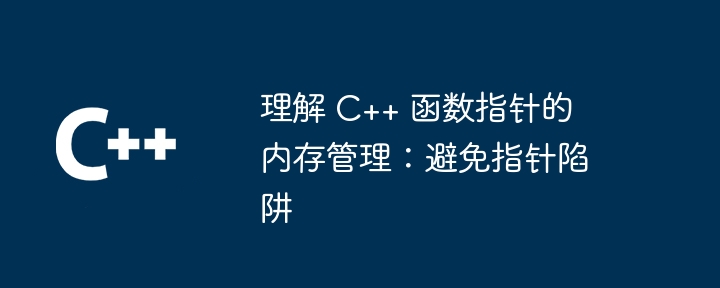
When using function pointers in C, memory management must be carefully considered to avoid pitfalls. These traps include dangling pointers (pointing to functions outside their scope) and wild pointers (function pointers that are never initialized or set to nullptr). To avoid these pitfalls, follow these best practices: always initialize function pointers, manage memory carefully, and use smart pointers. This way you can use function pointers safely and avoid falling into pointer traps.

Understanding memory management of C function pointers: Avoiding pointer traps
A function pointer is a pointer type that points to a function address. When using function pointers in C, memory management must be carefully considered to avoid potential pointer pitfalls.
Declaration and usage of function pointers
typedef int (*FunctionPointer)(int);
This defines a A function pointer type to a function that returns int and accepts one int argument. To declare a function pointer variable, use the following syntax:
FunctionPointer funcPointer;
To point a function pointer to a specific function, use the address operator (&) :
funcPointer = &myFunction;
Now, funcPointer can be used like a normal pointer, it will call myFunction .
Memory management pitfalls
There are some important memory management pitfalls with function pointers in C.
nullptr, it is called a wild pointer. Dereferencing a wild pointer will cause the program to crash. To avoid these pitfalls, follow these best practices:
nullptr or points to a known function. std::function or another smart pointer type to automatically release the function pointed to. Practical case
The following code demonstrates the memory management trap of function pointers in C:
// 悬浮指针示例
void myFunction() {}
{
FunctionPointer funcPointer = &myFunction;
} // myFunction 已销毁
// 野指针示例
FunctionPointer funcPointer = nullptr;
funcPointer(); // 程序崩溃To solve these problems, you can do this Do:
// 使用智能指针
std::function<int(int)> funcPointer = [] (int x) { return x; };
// 在函数指针的整个生命周期内保持指向函数的有效性
int myFunction() { return 42; }
FunctionPointer funcPointer = &myFunction;By following these best practices, you can safely use function pointers in C and avoid potential pointer pitfalls.
The above is the detailed content of Understanding Memory Management of C++ Function Pointers: Avoiding Pointer Traps. For more information, please follow other related articles on the PHP Chinese website!
 The difference between typedef and define
The difference between typedef and define
 Usage of typedef in c language
Usage of typedef in c language
 What are the differences between c++ and c language
What are the differences between c++ and c language
 Recommended learning order for c++ and python
Recommended learning order for c++ and python
 Cost-effectiveness analysis of learning python and c++
Cost-effectiveness analysis of learning python and c++
 Is c language the same as c++?
Is c language the same as c++?
 Which is better to learn first, c language or c++?
Which is better to learn first, c language or c++?
 The difference and connection between c language and c++
The difference and connection between c language and c++




